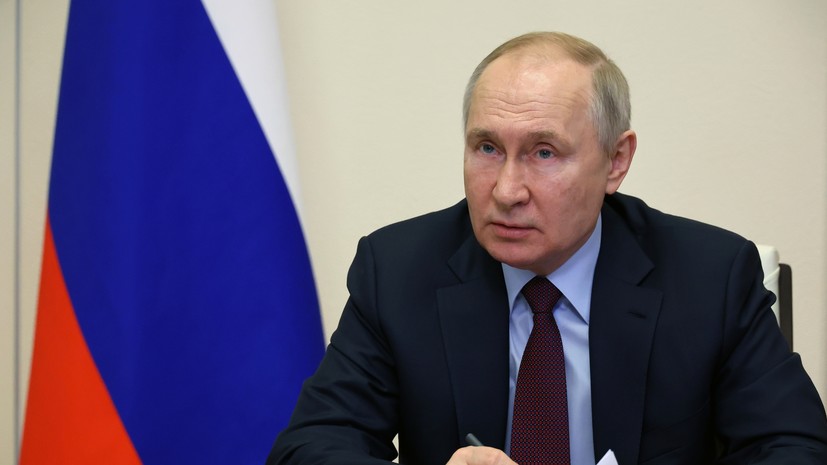The Russian authorities will continue to implement large-scale socio-economic programs and plans aimed, among other things, at improving the well-being of citizens.
On Wednesday, January 11, President Vladimir Putin drew attention to this during the first meeting with the Cabinet of Ministers in 2023.
“We certainly have all the resources for this... It is necessary to build economic policy measures in such a way that they lead to an increase in real wages and incomes of people, and together with social support measures (primarily for families with children) ensure further reduction of poverty and inequality,” the head of state instructed.
According to him, work in this direction should cover all regions, including new subjects of the Russian Federation.
As the Russian leader emphasized, the authorities are obliged to provide a systematic, comprehensive approach to the integration of the Donetsk and Luhansk People's Republics, as well as the Zaporozhye and Kherson regions into a single socio-economic space of the country.
“It is important to set clear guidelines for the development of new regions of Russia, understandable for citizens, so that residents know what will be built in their cities and towns, what facilities will be restored and when, how families’ incomes will increase, what assistance they will receive from the state, how children’s kindergartens, schools, universities, hospitals and clinics, when will enterprises open, what support will small businesses and entrepreneurs receive, how will infrastructure and transport develop,” Putin added.
RIA News
© Mikhail Klimentiev
It is noteworthy that even under conditions of external pressure on the Russian economy, the level of poverty in the country continues to gradually decrease.
This conclusion follows from the materials of Rosstat.
According to the latest estimates of the department, over the year the poverty line in the Russian Federation has grown from about 12 thousand to 13.7 thousand rubles.
At the same time, the number of people with incomes below this threshold decreased from 16 million to 15.3 million, and the share of the poor decreased from 11 to 10.5%.
“The decline is really small, but it is important that in the current difficult economic situation there is such a definite positive trend.
It needs to be preserved,” Vladimir Putin said earlier.
According to the president, the decline in the number of low-income Russians is largely due to measures of state support for the population.
So, in 2022, a program for issuing benefits to needy families with children under 17 began to work.
In addition, pensions, the minimum wage (SMIC) and the subsistence minimum (PM) were indexed twice, as a result of which the volume of many social payments increased.
And from January 1, 2023, the size of pensions, the minimum wage, the PM and a number of benefits were further increased.
It is assumed that this will partially compensate citizens for the increase in consumer prices that occurred during the year and will lead to a further reduction in poverty.
Svetlana Bessarab, a member of the State Duma Committee on Labor, Social Policy and Veterans Affairs, shared this opinion in an interview with RT.
“This year the positive dynamics will continue.
We are developing social contracts, including those for running your own business and farming.
There are also retraining programs for professions in demand, which allows maintaining and developing the labor market.
For families with children, the key financial support will be the universal allowance, which has been in operation since January 1,” Bessarab noted.
In addition to various state support measures, the growth of real incomes of citizens should be facilitated by the general deceleration of inflation in Russia.
During a meeting with the president, the head of the Ministry of Economic Development, Maxim Reshetnikov, said that at the end of last year, the dynamics of consumer price growth in the country turned out to be better than originally expected.
Recall that back in the spring of 2022, against the backdrop of large-scale Western sanctions, annual inflation in Russia approached 18% for the first time in 20 years, after which it began to gradually slow down.
The government expected that by the end of December the figure would drop to 12.4%, but in reality the value dropped to 11.9%.
“We proceed from the fact that at the end of the first quarter (2023. -
RT
) inflation will drop significantly year on year, since we have a price peak in May (2022. -
RT
) will leave the base.
And in the second quarter we will already see those numbers that are likely to be even lower than our target level of 4%.
At least for a certain period," Reshetnikov said.
A similar forecast was previously given by the Central Bank.
As Central Bank Chairman Elvira Nabiullina said, next spring inflation in Russia may temporarily drop below 4%, but by the end of 2023 it will be about 5-7%.
A similar point of view in an interview with RT was expressed by Alexander Razuvaev, a member of the Supervisory Board of the Guild of Financial Analysts and Risk Managers.
“I think that in 2023 inflation will fall to about 6%.
Of course, this can have a positive impact on low-income Russians, as their disposable income and ability to buy goods will increase.
The poverty level in this case can reach up to 10%,” the expert concluded.

